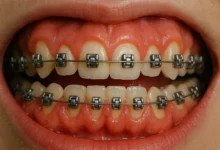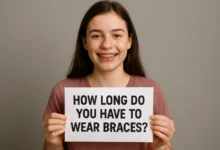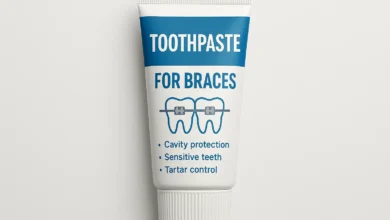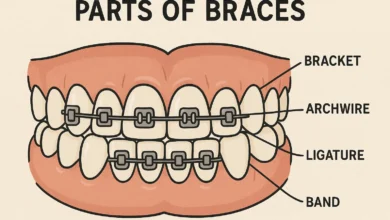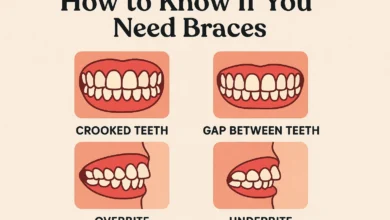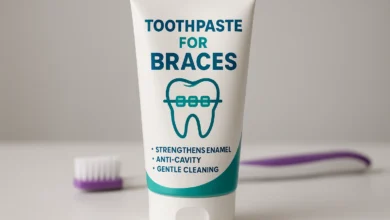Does Medical Cover Braces? Shocking Facts You Need Before Starting Treatment
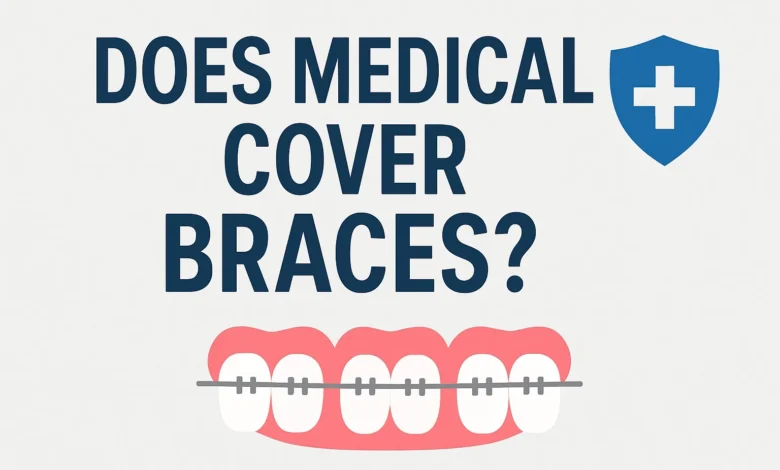
Does Medical Cover Braces? A Complete Guide to Orthodontic Coverage in 2025
1. Introduction
Orthodontic treatment exists to address both functional problems and cosmetic concerns. Braces serve as a treatment solution for patients who need to address jaw misalignment and bite problems and teeth irregularities. The high expense of braces leads people to ask if medical insurance provides any coverage for these dental treatments.
This guide provides a complete analysis of medical and dental insurance plans to determine if medical coverage exists for braces and its impact on treatment expenses.
2. Understanding Medical Insurance vs Dental Insurance
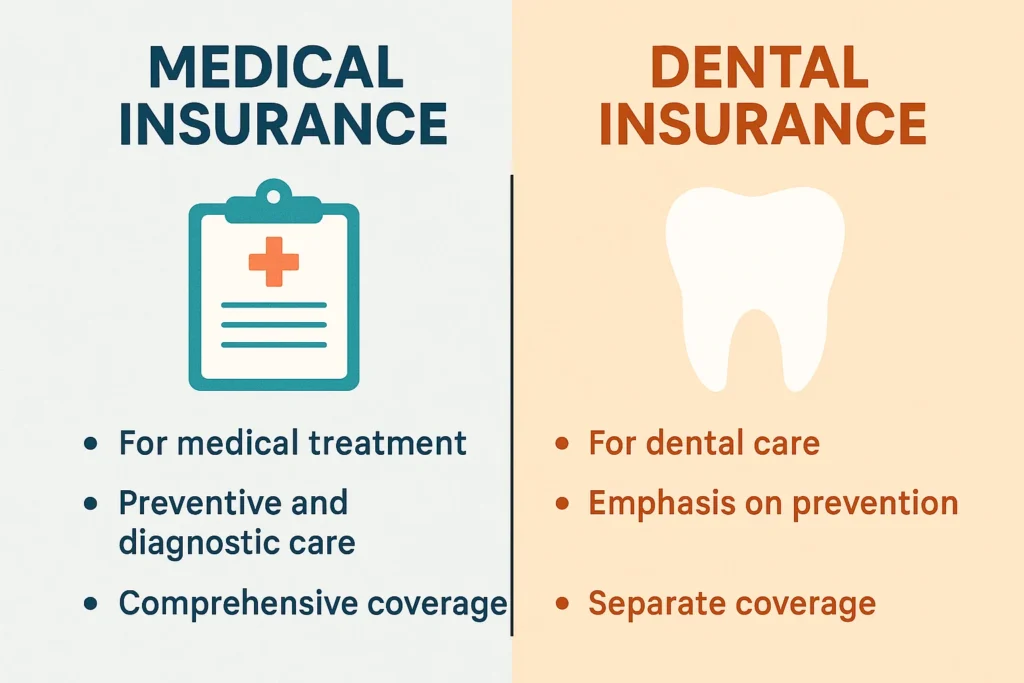
Before answering does medical cover braces, it’s crucial to distinguish between two major types of health plans:
Medical Insurance: The plan includes coverage for medical conditions and surgical procedures that are both emergency-based and essential for health maintenance.
Dental Insurance: Covers routine dental care, cleanings, fillings, and sometimes orthodontic treatments like braces.
The cost of braces usually falls under dental insurance coverage but there are specific cases where medical necessity can lead to different coverage rules.
3. Does Medical Cover Braces? – The Core Question
Let’s get straight to the point: does medical cover braces?
The Answer: Sometimes.
Medical insurance does not provide coverage for elective orthodontic procedures but it will pay for braces when they serve a medical purpose. Your condition needs to create substantial health problems for insurance to cover braces.
Difficulty chewing or speaking
Jaw pain or temporomandibular joint disorder (TMJ)
Trauma-related dental misalignment
Severe overbite or underbite causing health complications
Thus, does medical cover braces? Yes, but only under specific, health-related circumstances.
4. Medicaid and Braces: What You Should Know
Medicaid recipients who need to know if their government program covers braces for medical purposes.
Key Facts:
The majority of states through Medicaid provide coverage for braces for children and teenagers when medical necessity is established.
Coverage for adults is very limited and available in few states only.
Medicaid Coverage Requirements:
A referral from a licensed dentist or orthodontist
Evidence of medical necessity
Pre-authorization and review from the Medicaid agency
5. When Braces Are Medically Necessary
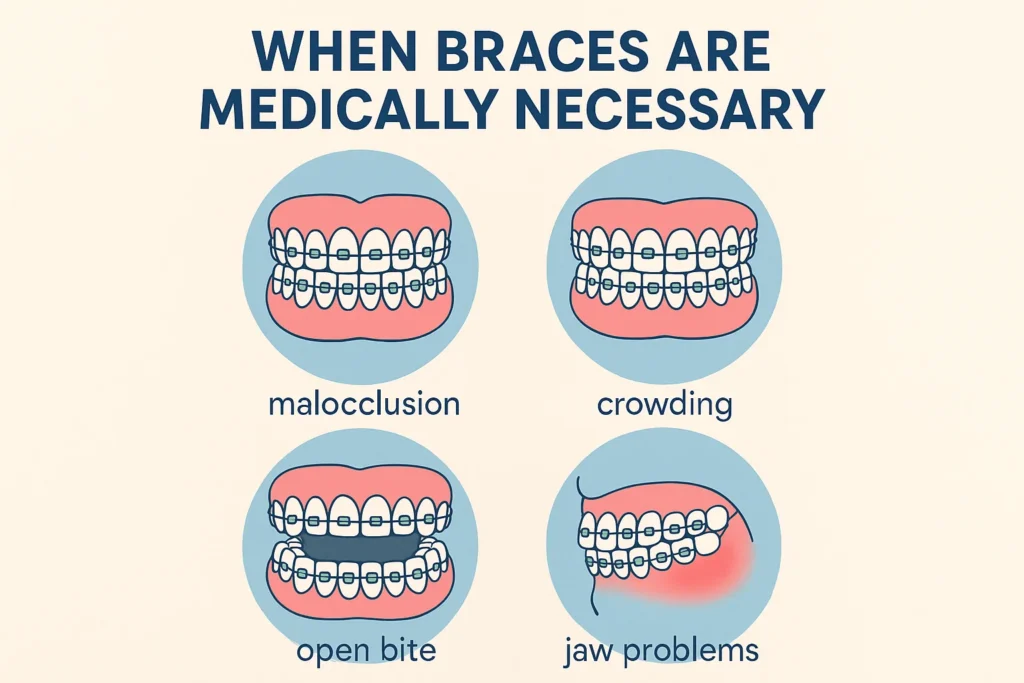
To qualify for medical coverage, you must demonstrate that your need for braces isn’t just cosmetic.
Conditions That May Qualify:
Severe jaw misalignment causing chronic pain
Sleep apnea due to oral structure
Difficulty in speaking or swallowing
Congenital disorders like cleft palate
If your case fits any of these, does medical cover braces for you? Most likely, yes.
6. State-by-State Medicaid Coverage for Braces
Medicaid benefits vary widely. Here’s a breakdown of a few states as of 2025:
| State | Covers Children | Covers Adults | Notes |
|---|---|---|---|
| California | Yes | No | Requires orthodontic score |
| Texas | Yes | No | Must meet medical necessity |
| Florida | Yes | Limited | Only if related to health outcome |
| New York | Yes | Yes (some cases) | Rare adult approval |
| Illinois | Yes | No | Based on dental review board |
This makes it clear that does medical cover braces depends heavily on your state and age.
7. Types of Braces That May Be Covered
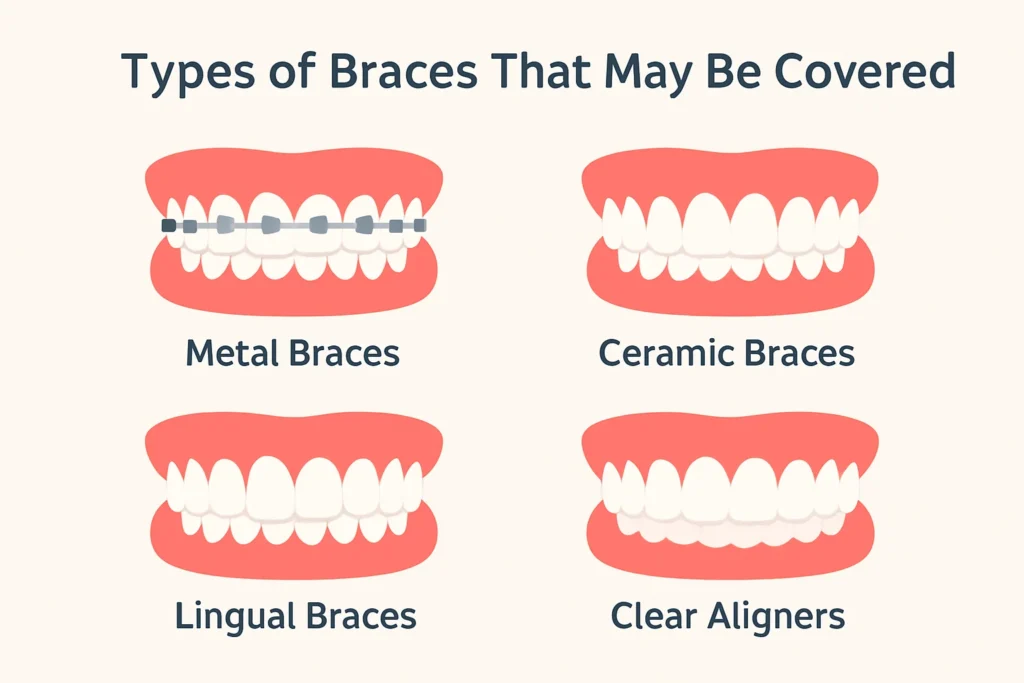
The type of braces used for treatment also plays a crucial role in determining whether medical coverage will apply to braces. Medical insurance together with Medicaid programs tend to provide coverage for functional braces instead of cosmetic ones.
Braces More Likely to Be Covered:
Traditional metal braces
Ceramic braces (sometimes)
Functional appliances (e.g., Herbst appliance)
Palatal expanders
Less Likely to Be Covered:
Invisalign or other clear aligners
Lingual braces
Cosmetic-only braces
Always ask: Does medical cover braces of the type you’re considering?
8. Eligibility Criteria for Orthodontic Coverage
You need to meet specific requirements for insurance coverage because simple application does not guarantee approval. Insurance providers need to evaluate your case based on established criteria before making a decision.
Typical Eligibility Checks:
Age (preferably under 21 for Medicaid)
Documented jaw dysfunction
Speech impediment caused by dental structure
Functional disability due to dental issue
Providing thorough documentation helps determine the answer to does medical cover braces for your unique case.
9. Required Documentation for Medical Coverage
When applying through medical channels for braces, documentation is key.
What You May Need:
Referral letter from a dentist/orthodontist
X-rays, scans, or photos of the teeth/jaw
Speech evaluation (if applicable)
Functional analysis report
Medical necessity form
With the right paperwork, you stand a better chance of getting the answer yes to does medical cover braces.
10. How to Apply for Braces Coverage Through Medical
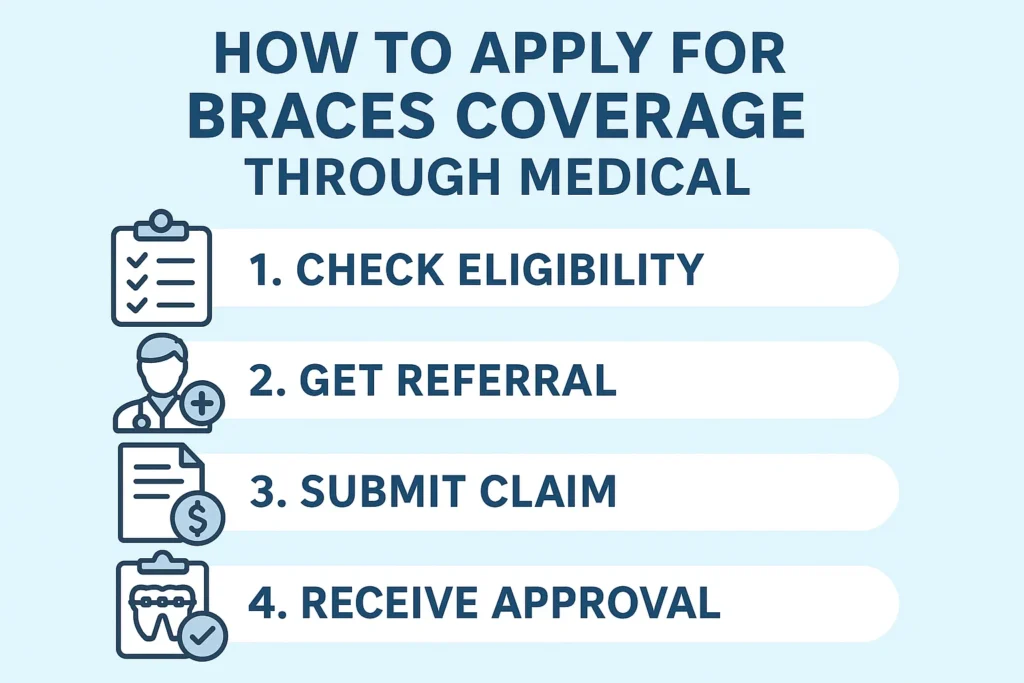
Here’s a general step-by-step process:
Initial Evaluation: Visit an orthodontist for a full assessment.
Medical Justification: Determine if the condition is medically necessary.
Insurance Verification: Ask your provider, “does medical cover braces in this case?”
Submit Documentation: Complete and send all forms and records.
Pre-Authorization: Wait for insurer approval before starting treatment.
Keep thorough records and always double-check before moving forward.
11. What If You’re Denied Coverage?
Many people receive denials at first. But denial is not the end.
What You Can Do:
Appeal: File an appeal with additional documentation.
Second Opinion: Get another orthodontist’s input.
Medical Advocate: Ask a care coordinator or social worker to assist.
Grievance Filing: In some states, you can escalate to a state board.
Being persistent can change the outcome of does medical cover braces from “no” to “yes.”
12. Supplementing Coverage with Dental Insurance
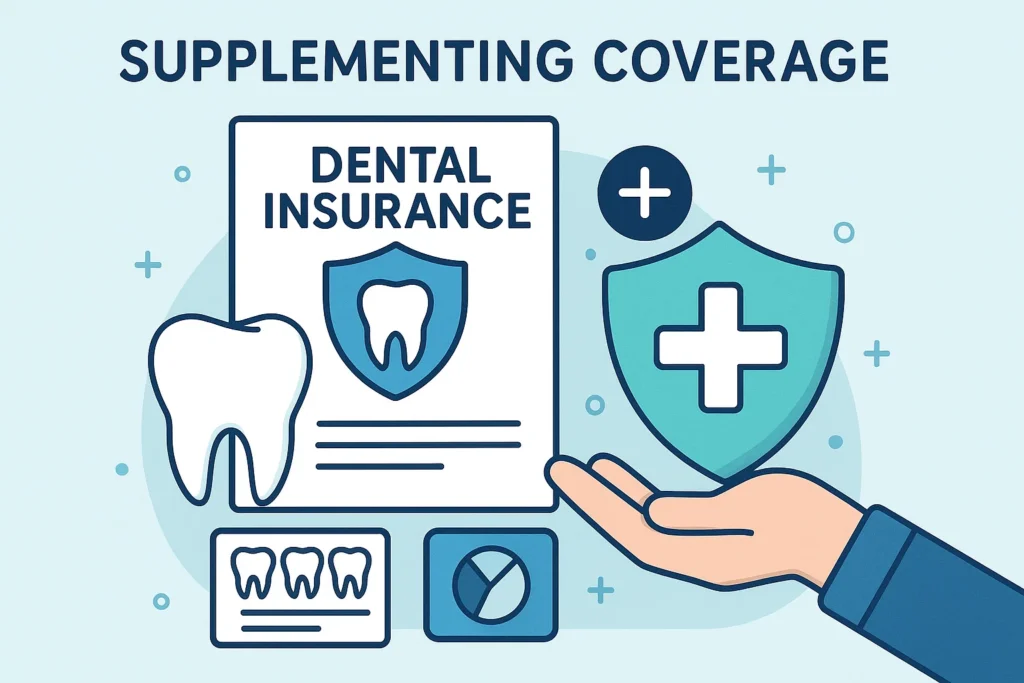
You can buy a separate dental insurance plan that includes orthodontic coverage if your medical insurance denies braces.
Common Plans That Help:
Delta Dental
Cigna Dental
Guardian Direct
Aetna Dental
Always read the fine print. Review the policy details to understand the waiting periods and co-payment requirements and the maximum amount of orthodontic treatment that the insurance will cover. Dental insurance does not automatically answer the question about medical coverage for braces but you might discover alternative coverage options.
13. Alternatives When Medical Doesn’t Cover Braces
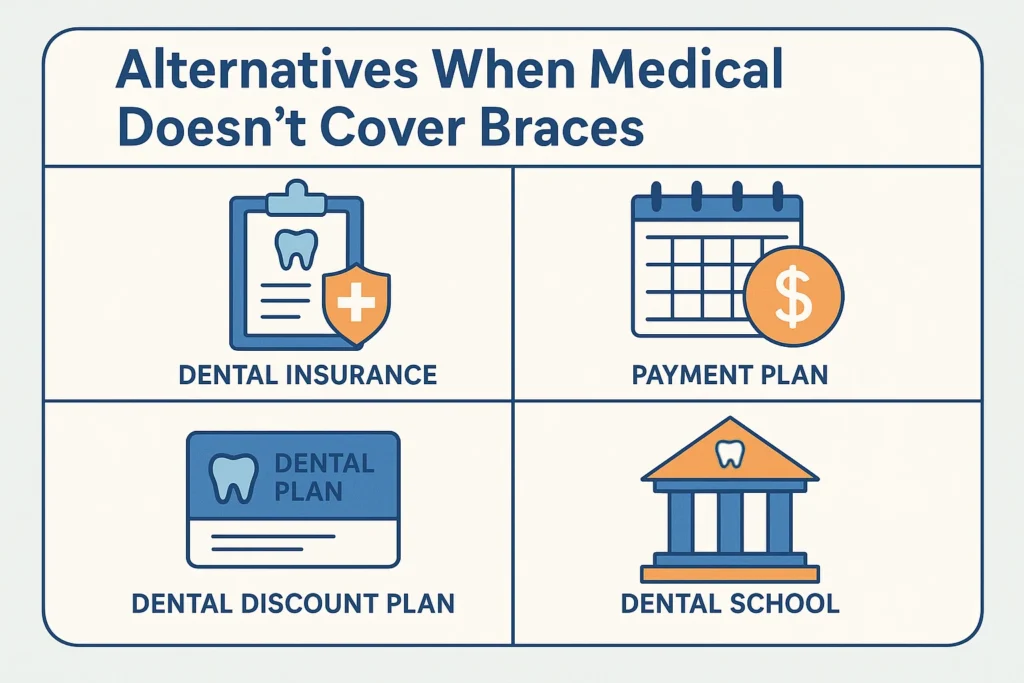
Not everyone qualifies for medical or Medicaid coverage. But you still have options:
Low-Cost Alternatives:
Orthodontic Schools: Discounted services by supervised students.
Payment Plans: Many orthodontists offer 0% interest options.
Discount Plans: Dental savings plans reduce out-of-pocket costs.
Non-Profit Clinics: Federally funded or community-based health centers.
So even if the answer to does medical cover braces is “no,” you’re not out of options.
14. FAQs on Does Medical Cover Braces
Q1: Does medical cover braces for adults?
A: Usually no, except in cases of extreme medical necessity or in select states.
Q2: Does medical cover braces for children?
A: Yes, especially through Medicaid if deemed medically necessary.
Q3: Are Invisalign or clear aligners covered by medical insurance?
A: Rarely, as they are usually considered cosmetic.
Q4: How can I prove my braces are medically necessary?
A: By providing X-rays, documentation, and referrals from licensed professionals.
Q5: Will private insurance ever cover braces under medical?
A: Some private medical plans cover braces when tied to trauma or jaw disorders.
15. Conclusion
So, does medical cover braces in 2025?
Yes, medical insurance will cover orthodontic treatment when it is required for health reasons. Traditional health insurance plans do not provide coverage for braces but there are particular medical situations which allow children and adults to receive orthodontic treatment. Medicaid provides essential orthodontic coverage to children who meet specific requirements and adults can obtain partial or complete coverage through proper documentation and continuous efforts in exceptional circumstances.
The process requires knowledge about your insurance coverage and your health status and the rules that apply in your state. Medical insurance denial does not prevent you from finding alternative ways to obtain orthodontic care.

